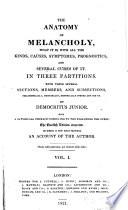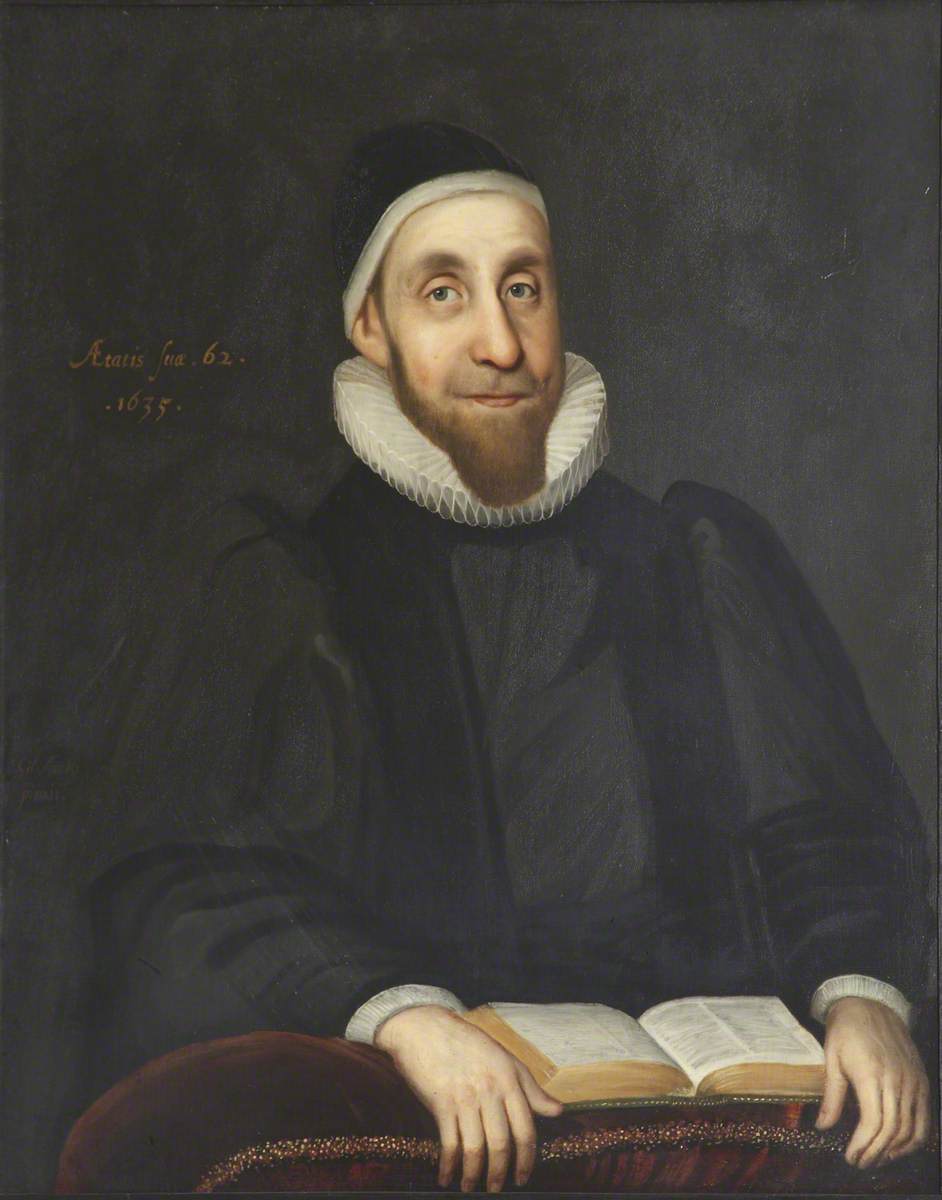Works

The Anatomy of Melancholy
Robert BurtonFamous Robert Burton Quotes
“What can't be cured must be endured.”
Section 2, member 3.
Variant: What can't be cured must be endured.
Source: The Anatomy of Melancholy (1621), Part II
“The pen worse than the sword.”
Hinc quam sic calamus sævior ense, patet.
Section 2, member 4, subsection 4.
The Anatomy of Melancholy (1621), Part I
“Almost in every kingdom the most ancient families have been at first princes' bastards.”
Section 3, Member 2, Remedies against discontents.
The Anatomy of Melancholy (1621), Part II
“Every man for himself, his own ends, the Devil for all.”
Section 1, member 3.
The Anatomy of Melancholy (1621), Part III
“A nightingale dies for shame if another bird sings better.”
Section 2, member 3, subsection 6.
The Anatomy of Melancholy (1621), Part I
Robert Burton: Trending quotes
“I light my candle from their torches.”
Section 2, member 5, subsection 1.
The Anatomy of Melancholy (1621), Part III
Section 2, member 3, subsection 7, Envy, Malice, Hatred, Causes.
The Anatomy of Melancholy (1621), Part I
Context: Every other sin hath some pleasure annexed to it, or will admit of an excuse; envy alone wants both. Other sins last but for awhile; the gut may be satisfied, anger remits, hatred hath an end, envy never ceaseth.
Section 4, member 2, subsection 3, Causes of Despair, the Devil, Melancholy, Meditation, Distrust, Weakness of Faith, Rigid Ministers, Misunderstanding Scriptures, Guilty Consciences, etc.
The Anatomy of Melancholy (1621), Part III
Robert Burton Quotes
“[T]hou canst not think worse of me than I do of myself.”
Source: The Anatomy of Melancholy
“He that increaseth wisdom, increaseth sorrow.”
Source: The Anatomy of Melancholy
Source: The Anatomy of Melancholy
“If you like not my writing, go read something else.”
Source: The Anatomy of Melancholy
“Idleness is an appendix to nobility.”
Section 2, member 2, subsection 6. Immoderate Exercise a cause, and how. Solitariness, Idleness.
The Anatomy of Melancholy (1621), Part I
“A mere madness, to live like a wretch and die rich.”
Section 2, member 3, subsection 12, Covetousness, a Cause.
The Anatomy of Melancholy (1621), Part I
“All my joys to this are folly
Naught so sweet as melancholy.”
The Author's Abstract.
The Anatomy of Melancholy (1621)
“Every man hath a good and a bad angel attending on him in particular, all his life long.”
Section 2, member 1, subsection 2, A Digression of the nature of Spirits, bad Angels, or Devils, and how they cause Melancholy.
The Anatomy of Melancholy (1621), Part I
“Out of too much learning become mad.”
Section 4, member 1, subsection 2.
The Anatomy of Melancholy (1621), Part III
“See one promontory (said Socrates of old), one mountain, one sea, one river, and see all.”
Section 2, member 4, subsection 7.
The Anatomy of Melancholy (1621), Part I
The Anatomy of Melancholy (1621), Democritus Junior to the Reader
Section 3, member 4, subsection 1.
The Anatomy of Melancholy (1621), Part III
“I would help others, out of a fellow-feeling.”
The Anatomy of Melancholy (1621), Democritus Junior to the Reader
Section 2, member 3, subsection 11, Concupiscible Appetite, as Desires, Ambition, Causes.
The Anatomy of Melancholy (1621), Part I
“Fabricius finds certain spots and clouds in the sun.”
Section 2, member 3.
The Anatomy of Melancholy (1621), Part II
Section 2, member 2, subsection 2.
The Anatomy of Melancholy (1621), Part I
“Many things happen between the cup and the lip.”
Section 2, member 3, Air rectified. With a digression of the Air.
The Anatomy of Melancholy (1621), Part II
The Anatomy of Melancholy (1621), Democritus Junior to the Reader
“Every man, as the saying is, can tame a shrew but he that hath her.”
Section 2, member 6, Perturbations of the mind rectified. From himself, by resisting to the utmost, confessing his grief to a friend, etc.
The Anatomy of Melancholy (1621), Part II
“Be not solitary, be not idle.”
Section 4, member 2, subsection 6, Cure of Despair by Physic, Good Counsel, Comforts, etc.
The Anatomy of Melancholy (1621), Part III
“They are proud in humility; proud that they are not proud.”
Section 2, member 3, subsection 14, Philautia, or Self-love, Vainglory, Praise, Honour, Immoderate Applause, Pride, overmuch Joy, etc., Causes.
The Anatomy of Melancholy (1621), Part I
“One religion is as true as another.”
Section 4, member 2, subsection 1, Religious Melancholy in defect; parties affected, Epicures, Atheists, Hypocrites, worldly secure, Carnalists; all impious persons, impenitent sinners, etc.
The Anatomy of Melancholy (1621), Part III
Section 2, member 2.
The Anatomy of Melancholy (1621), Part II
“When they are at Rome, they do there as they see done.”
Section 4, member 2, subsection 1.
The Anatomy of Melancholy (1621), Part III
Section 4, member 1, subsection 2, Causes of Religious melancholy. From the Devil by miracles, apparitions, oracles. His instruments or factors, politicians, Priests, Impostors, Heretics, blind guides. In them simplicity, fear, blind zeal, ignorance, solitariness, curiosity, pride, vainglory, presumption, &c. his engines, fasting, solitariness, hope, fear, etc.
The Anatomy of Melancholy (1621), Part III
“No rule is so general, which admits not some exception.”
Section 2, member 2, subsection 3, Custom of Diet, Delight, Appetite, Necessity, how they cause or hinder.
The Anatomy of Melancholy (1621), Part I
“If the world will be gulled, let it be gulled.”
Section 4, member 1, subsection 2.
The Anatomy of Melancholy (1621), Part III
The Anatomy of Melancholy (1621), Democritus Junior to the Reader
Section 4, member 2, subsection 4, Symptoms of Despair, Fear, Sorrow, Suspicion, Anxiety, Horror of Conscience, Fearful Dreams and Visions.
The Anatomy of Melancholy (1621), Part III
“To enlarge or illustrate this power and effect of love is to set a candle in the sun.”
Section 2, member 1, subsection 2.
The Anatomy of Melancholy (1621), Part III
born
Section 2, member 2.
The Anatomy of Melancholy (1621), Part II
“The fear of some divine and supreme powers keeps men in obedience.”
Section 4, member 1, subsection 2, Causes of Religious melancholy. From the Devil by miracles, apparitions, oracles. His instruments or factors, politicians, Priests, Impostors, Heretics, blind guides. In them simplicity, fear, blind zeal, ignorance, solitariness, curiosity, pride, vainglory, presumption, &c. his engines, fasting, solitariness, hope, fear, etc.
The Anatomy of Melancholy (1621), Part III
“Like the watermen that row one way and look another.”
The Anatomy of Melancholy (1621), Democritus Junior to the Reader
“Where God hath a temple, the Devil will have a chapel.”
Section 4, member 1, subsection 1.
The Anatomy of Melancholy (1621), Part III
“Set a beggar on horseback and he will ride a gallop.”
Section 2, member 2.
The Anatomy of Melancholy (1621), Part II
Section 2, member 2, subsection 3.
The Anatomy of Melancholy (1621), Part III
Section 2, member 3.
The Anatomy of Melancholy (1621), Part II
“I had not time to lick it into form, as a bear doth her young ones.”
The Anatomy of Melancholy (1621), Democritus Junior to the Reader
“[Desire] is a perpetual rack, or horsemill, according to Austin, still going round as in a ring.”
Section 2, member 3, subsection 11.
The Anatomy of Melancholy (1621), Part I
“They do not live but linger.”
Section 2, member 3, subsection 10.
The Anatomy of Melancholy (1621), Part I
“Him that makes shoes go barefoot himself.”
The Anatomy of Melancholy (1621), Democritus Junior to the Reader
“Can build castles in the air.”
Section 2, member 1, subsection 3.
The Anatomy of Melancholy (1621), Part I
Section 1, member 2, subsection 1.
The Anatomy of Melancholy (1621), Part III
Section 3, member 1, subsection 2.
The Anatomy of Melancholy (1621), Part I
Section 2, member 3, subsection 12.
The Anatomy of Melancholy (1621), Part I
Section 2, member 1, subsection 3.
The Anatomy of Melancholy (1621), Part I
“All places are distant from heaven alike.”
Section 2, member 4, Exercise rectified of Body and Mind.
The Anatomy of Melancholy (1621), Part II
The Anatomy of Melancholy (1621), Democritus Junior to the Reader
“Carcasses bleed at the sight of the murderer.”
Section 1, member 2, subsection 5.
The Anatomy of Melancholy (1621), Part I
